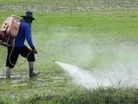Argentines suffering from health problems due to agrochemicals

Written by Alyssa Clark
The Associated Press has conducted a survey of farm workers around the world to document cases where farm-related chemicals and poisons have unexpectedly taken the medical world by storm in terms of their devastating physical and mental health risks. One example of a study tested that 80 percent of children surveyed in the Ituzaingo Annex carried traces of pesticides in their blood— an alarming number to those who even anticipated these kinds of agrochemical-induced health risks.
After exploring the stories of people like Sofia Gatica, who lost her newborn to kidney failure from the affects of these agrochemicals, and schoolteacher Andrea Druetta of the Santa Fe Province, which is the heart of Argentina’s soy bean farming and production, who learned that her sons were showering in contaminated water in the backyard swimming pool, the public is finally speaking out against the injustice.
American biotechnology has catapulted Argentina to now stand as the world’s third-largest soy bean producer, but with its use of chemicals powering the cultivation of this crop, the negative effects are no longer being held to simply those who handle or spray the beans themselves.
"The change in how agriculture is produced has brought, frankly, a change in the profile of diseases," says Dr. Medardo Avila Vazquez, a pediatrician and neonatologist who co-founded Doctors of Fumigated Towns, part of a growing movement demanding enforcement of agricultural safety rules. "We've gone from a pretty healthy population to one with a high rate of cancer, birth defects, and illnesses seldom seen before."
Agrochemicals were on the decline in earlier years, but increased by the ninefold to 9 million gallons used in 1990, to the outrageous 84 million gallons that are used today. Argentine farmers are estimated to apply 4.3 pounds of agrochemical concentrate per acre of land, which is double the American norm, according the Associated Press’s analysis of Argentine agriculture.
The Agriculture Secretary responded to these recent developments by saying, "I've seen countless documents, surveys, videos, articles in the news and in universities, and really our citizens who read all this end up dizzy and confused," Agriculture Secretary Lorenzo Basso said. "I think we have to publicize the commitment that Argentina has to being a food producer. Our model as an exporting nation has been called into question. We need to defend our model."
Concerned researchers and scientists around the world are already hard at work diving into this recently surfaced problem, in hopes of quickly identifying the factual proof which can tie the agrochemicals to the negative and serious health problems plaguing so many of Argentina’s people.
"That's why we do epidemiological studies for heart disease and smoking and all kinds of things," said Doug Gurian-Sherman, a former EPA regulator now with the Union of Concerned Scientists. "If you have the weight of evidence pointing to serious health problems, you don't wait until there's absolute proof in order to do something."



